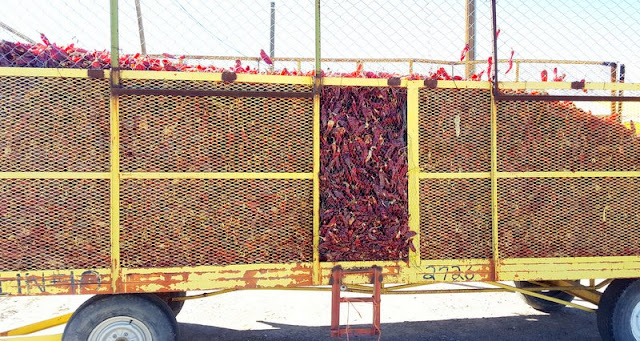We realized that we knew nothing about these potent peppers, so we went in search of information. What better place is there to get educated than a college? So we headed to New Mexico State University in Las Cruces. Since we retired from a university, we like to visit campuses all over the country. We found the buildings on the NMSU campus to be a random mixture of architectural styles. But there were more flat-topped-clay-tiled-adobe buildings than most campuses.
After wandering around campus on a beautiful weather day, we finally got directions to the Chile Institute Store on the second floor of an academic building. Here we found a full-time employee that was happy to answer all the chile questions that had been burning in our minds. We found they have a master chile breeder at the university, who is responsible for most of the best varieties of chile peppers in New Mexico. At the store they sold seeds for those varieties, as well as salsa, cooking sauces, and these beautiful ornamental chile pepper plants that were developed on campus.
Their brochure taught us chile facts that we'll sprinkle throughout this blog. So when you see a random statement surrounded by asterisks, know that it is a chile fact from the New Mexico Chile Institute--not from us.
**One fresh medium-sized green chile pod has as much Vitamin C as six oranges.**
Our next source of education came from the Las Cruces Farmer's Market. At the Main Street Plaza on Saturday and Wednesday mornings, there was a chile vendor selling large and small bags of dried peppers and honey. They also had many of the ornamental ristras, made from attaching the dried peppers into decorative clusters. The shiny ones have been lacquered and are strictly ornamental. The duller ones can be used for cooking. By simply cutting off a few dried peppers, one can rehydrate them to make red enchilada sauce.
**One teaspoon of dried red chile powder has the daily requirement of Vitamin A.**
While we were at the farmer's market, we also learned that the official cookie of New Mexico is the biscochitos. Also called "wedding cookies" we tried samples of the pecan, plain, and raspberry chile biscochitos. But when it came to buy, Mark purchased a cherry/apricot empanada instead.
This chile-learning can work up an appetite. So Denisa purchased a half dozen mini-donuts from another vendor. We have heard about a baker's dozen, where you get 13 when you purchase 12. We got a baker's half-dozen because he gave us 7.
It looks like our stomachs made us digress a little from all things chile! Another vendor (selling jewelry) suggested going to Hatch, New Mexico, so we decided that would be another good source for our chile education. We had heard about Hatch chiles for years, and it is the self-proclaimed "Chile Capital of the World." We found ristras hung all over town, some almost as tall as Denisa.
**Hot chile peppers burn calories by triggering a thermodynamic burn in the body, which speeds up the metabolism.**
In a town 1,600, there are probably ten different chile stores in Hatch. This was our favorite, and had the best prices. We were amazed that bags of dried chile peppers were so cheap, and they were labeled from mild to XXHot.
There were big trailers full of more chile peppers outside. We liked this trailer with a door to get a close-up of its cargo.
There were more chile pepper trailers parked behind the store, with men working around a table separating them by hand.
**Teas and lozenges are made with chile peppers for the treatment of a sore throat.**
Because we don't have room in our motor home for a five-foot-tall ristra, we opted for the smallest bag of powdered chile instead. That smallest bag was actually in a one-quart zip-lock bag. We also found that this was dehydrated and powdered in a plant in Hatch, and is 100% chile. It is different from the chili powder available in the grocery store that has things like garlic, salt, cumin or oregano added to it. We also had to seal it in another bag, as its aroma is quite (ahem) robust.
**Capsaicinoids, the chemical that make chile peppers hot, are used in muscle patches for sore and aching muscles.**
In our quest for more knowledge, we felt compelled to do more tasting. So we visited the locals' favorite diner that says it has the "best burgers in town." Strictly for educational purposes, we ordered a green chile cheeseburger, and the chile relleno burrito smothered in green chile sauce. It was the most delicious educational experience we have every completed.
Our friend at the Chile Pepper Institute at New Mexico State University said his favorite chile dish was the green chile enchiladas at Andele's. So of course we had to try them as well. We should have taken a picture, because they were like no enchiladas we had every seen. Denisa ordered three chicken green chile enchiladas. What she got was actually three flat corn tortillas stacked one on top of the other, drenched in green chile sauce with grilled chicken piled across the top. Sorry that we didn't take a picture, but they were unique and delicious (and consumed before we thought about the camera).
**The color extracted from very red chile pepper pods, oleoresin, is used in everything from lipstick to processed meats.**
So we feel like we have learned much about the chile pepper since we've arrived in New Mexico. But being true scholars, we intend to continue in our quest for knowledge as we eat our way across the southwest in search of the best capsaicinoids now we know they are thermodynamic and naturally burn calories!













No comments:
Post a Comment